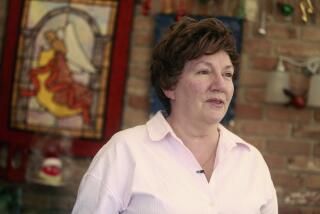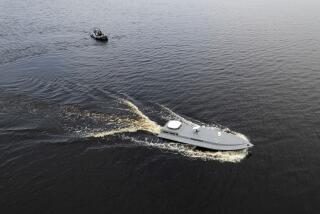FAME? PRICELESS
THE cellphone rang on a recent afternoon, displaying an unfamiliar 818 number.
“Hello,” said the voice on the other end. “It’s George Clooney.”
Usually, when an actor calls a reporter, it’s to promote a film. But Clooney had more serious matters on his mind.
He wanted to discuss two subjects: American presidential politics (he’s supporting Sen. Barack Obama in his bid for the Democratic nomination in 2008) and the conflict raging in Darfur, a region in western Sudan where more than 450,000 people have been killed in an ethnic cleansing campaign that President George W. Bush recently declared a genocide.
Clooney, who has become one of his generation’s most politically active stars, has been weighing his options on the presidential front. He would love to campaign for Obama -- he’s a fan and a friend of the politician, whom he met at a Darfur rally two years ago -- but he’s worried that his support could be used against the senator. He knows that not everyone in America wants to know where celebrities stand on politics. The Oscar-winning actor witnessed it firsthand when his father, Nick Clooney, ran for Congress as a Democrat in the family’s home state of Kentucky in 2004.
“It became an issue of Hollywood versus the heartland,” Clooney said. His father ultimately lost, and it makes George reticent. “I don’t want to be a hindrance, you know?”
Clooney’s efforts mark a certain coming of age, as the 46-year-old actor/director/screenwriter tries to move beyond the glitter of Hollywood to find his true voice. It also comes with realizing the power -- and the limitations -- of stardom, knowing when to push and when to hold back.
Clooney has no such reservations about Darfur. “If celebrity is a credit card, then I’m using it,” Clooney said. “I knew I had to shine light on this situation.”
His efforts to raise awareness about the war there have gained him the respect of his Hollywood elders.
“So amazing to see these young guys get involved and grow,” legendary music producer Quincy Jones said in an interview last week. “That’s how we are supposed to live our lives. In the beginning, we do the quest for survival and materialism. And then you realize you have to get outside yourself, give something that will outlive you.”
The actor has been to the United Nations, twice. He’s traveled with actor Don Cheadle and Olympians Joey Cheek and Tegla Loroupe on a diplomatic mission to China and Egypt, where they pressed officials to use their power to intervene in Sudan. He has a team of advisors (young, hip former members of President Bill Clinton’s State Department). They keep him constantly informed on the developments in Darfur as well as in other parts of Africa.
Recently, he formed a foundation -- along with “Ocean’s Thirteen” costars Brad Pitt, Matt Damon and Cheadle -- to assist the victims of the Darfur conflict. The actors held a fundraiser for their foundation on a yacht at the Cannes Film Festival last month. They took in more than $9 million in one night.
After returning to America, they decided to capitalize on Hollywood’s favorite ritual: the movie premiere. They agreed to open “Ocean’s Thirteen” with a screening and a party in Las Vegas and Chicago two weeks ago. But it came with a caveat: Anyone could attend, but everyone had pony up some cash to get in; two people gave $250,000 in Vegas. By premiere night at Las Vegas’ annual film festival, CineVegas, $1 million had been raised.
“We made phone calls, we sent out notices, we opened up a second theater,” said festival President Robin Greenspan. “People would say, ‘That’s great. We’d love to give.’ And then they would ask, ‘What’s Darfur?’ That’s when we realized we definitely had to do this.”
Pitt said in an interview outside the Las Vegas premiere that the effort is “all about generating the will.”
“That’s the thing about the American people,” he said. “There’s great empathy and ingenuity when they understand something.... The bigger question is, what is the climate that allows these things to exist and continue?
“I’m hoping there will come a time when this does not exist. But it’s going to take a global effort.”
Of course, some people reject the effort because they don’t take actors seriously. Conservatives question Hollywood’s decidedly liberal politics and motivation for getting involved. But Clooney isn’t slowed down by cynicism or criticism.
“I think every individual I know can make a difference,” he said. “I certainly don’t like the idea of not trying.”
A life in politics
In many ways, the ever-confident Clooney is a natural politician. “He looks presidential,” his publicist, Stan Rosenfield, recently remarked.
But don’t get any ideas. Clooney has no intention of running for office. He simply loves the game.
Talk to him about movies and he’s positively engaging. But mention politics and he lights up. He loses track of time when he talks about Darfur. In a cellphone conversation in a car, his interviewer searches for more paper to take notes; quotes end up scribbled on the back of a DMV registration.
“We’re at a tipping point,” he said. “It’s absolutely imperative that we act now. There are 450,000 people dead. How many more must there be? Sometimes you just want to scream.”
Clooney comes by his activism naturally; he grew up with politics. In an earlier interview, this one at his back-lot bungalow in Studio City, Clooney sheds more light on this part of his life.
“My dad was an anchorman, you know?” he said, dressed in a faded green T-shirt and jeans. Sunlight streaming through the blinds shines on his still-gorgeous but at times weary-looking face. “I think if you’re the son of an anchorman, or if you’re an anchorman, for that matter, you’re involved in politics.
“That is part of what you do, and so we were always socially active and always socially involved and politically involved.”
So when the U.S. was preparing to invade Iraq in 2003, Clooney decided to speak out. “I said we should ask some questions before we sent 150,000 troops to Iraq.”
Conservative talk show hosts called him a traitor. They speculated that his career was over. “Oh, it was brutal,” Clooney recalled. Naturally, he called his dad for advice.
“He was like, ‘Grow up. You’re a big kid. You can take this. This isn’t bad. This isn’t anything,’ ” Clooney said. “ ‘Muhammad Ali gave up his [heavyweight champion’s] belt and risked going to prison and had to go to the Supreme Court for something on a much bigger scale -- becoming a conscientious objector to the Vietnam War. “
His father told him that he would end up “on the right side of history.” “And he was right,” Clooney said.
Firsthand experience
The actor used the experience as a catalyst for his work. He made two politically tinged films in 2005: “Good Night, and Good Luck,” which he co-wrote and directed, and “Syriana,” for which he won a best supporting actor Oscar.
Around that time, he started reading about the situation in Darfur. He wanted to see it firsthand. Again, he called his father, a man he calls “the smartest cat I know.” They scheduled a trip.
“All hell broke loose before we went,” Clooney said. “Chad was under siege by rebels trying to stage a coup, and you couldn’t get into Darfur, and South Sudan was blowing up.... The State Department sent us a memo saying, ‘Don’t do it.’ ”
They went in anyway. Clooney was stunned by the death and destruction. It was a life-transforming experience.
When it came to dealing with African issues and the problems of being a politically engaged celebrity, Clooney found still another close confidant. The Irish rock star Bono, who was recently knighted for his charity efforts in Africa, offered the actor plenty of advice.
“We had long conversations,” Clooney said. U2’s lead singer urged him to learn everything he could about the situation, “that way people can’t just dismiss you as just an entertainer. Bono is very good at putting a laser focus on specific issue. So when they come at him, whether they agree or not, at least you don’t feel like, well, here’s some rock ‘n’ roller just spewing out ideological theories. He sets the bar way way high.”
Vino and conversation
After a whirlwind tour promoting “Ocean’s Thirteen,” Clooney plans to spend the coming months at his vacation home in Lake Como, Italy, where he’ll edit his new movie, the romantic comedy “Leatherheads,” which he’s directing, writing and acting in, and visit with friends from a variety of backgrounds.
He holds dinner parties there with an eclectic mix of actors, diplomats, writers and producers that last into the early hours of the morning. Last year Norman Lear stopped by, as did Walter Cronkite. Quincy Jones said that he plans to swing by to see Clooney next month, after he finishes his own tour of Africa.
Talking politics and human rights issues with family and sympathetic friends is the actor’s idea of a really good time.
“My dad will come and my mom,” he says. “And you’ll watch all these great, incredible sunsets -- and you go outside and eat, you know, and it’s beautiful. And there’s these really great five-hour dinner conversations, and everybody drinks all the wine and they tell stories.”
It’s part party and part political salon -- Hollywood’s version of serious summer camp.
“I found that my job is to try and find ways of talking about issues that move us forward,” Clooney mused.
“That’s what you can do as a celebrity. You don’t make policy. But you can shine a light on faulty or good policy.”
More to Read
Start your day right
Sign up for Essential California for news, features and recommendations from the L.A. Times and beyond in your inbox six days a week.
You may occasionally receive promotional content from the Los Angeles Times.






